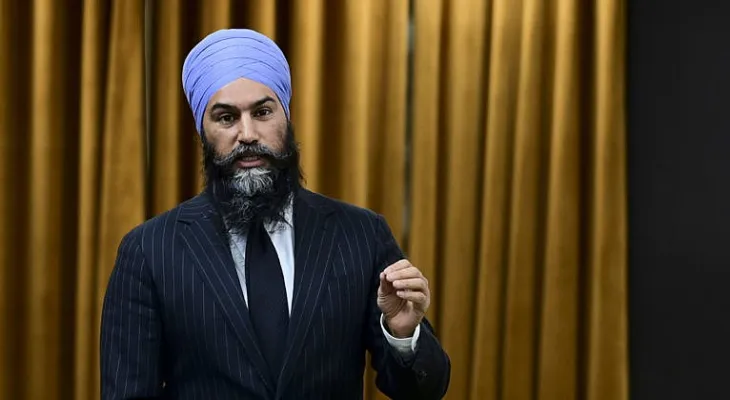Search here
Newspaper
Search here

Arab Canada News
News

Published: March 23, 2022
Ottawa - New Democratic leader Jagmeet Singh may face some tough questions amid the controversy surrounding a newly announced deal that would see his party support the Liberal minority government over the next three years
Lori Turnbull, a political science professor at Dalhousie University, said, "They no longer have any such power at all."
Details of the confidence and supply agreement reached between the New Democratic Party and the Liberals remained confidential under tight control by a small circle of people around the leaders of both parties until Monday evening, when members of parliament from both parties were allowed to announce the plans.
While Singh said his party supports the deal, the regular weekly party meeting on Wednesday will be an opportunity for New Democratic Party MPs to continue discussing this important shift in the party's focus.
The agreement states that New Democratic Party MPs will stand with the Liberals on key votes until 2025 - meaning they will not bring down the government on the next budget, for example, which is expected to be released in the coming weeks.
In return, the Liberals promised to move on some major New Democratic Party issues. But the document released by the Prime Minister’s office on Tuesday lacks details on how this will happen.
Turnbull said that while such deals tend to be unusual, it is normal parliamentary practice for parties to work together, especially in the case of minorities.
She said the problematic thing could be if the Liberals use it to shut down debates on important bills. It is too early to know if this is where things are heading.
She said, "There is a clear incentive here to take everything and convert it into a comprehensive budget bill so that everything passes."
On the other hand, the Conservatives criticized the deal, saying it was about preparing Prime Minister Justin Trudeau for a plan that would keep him and the Liberal government in power longer.
Marilyn Gladu, an Ontario Conservative MP, said Wednesday that the agreement will affect what opposition MPs can achieve in committees.
"In the past, if all opposition parties in a minority government disagreed with the government's direction, we could influence - but now we cannot."
Trudeau said Tuesday that the committee will continue its "core work" and Singh affirmed that the New Democratic Party will remain an independent opposition party holding the Liberal government accountable.
The dental care program for low-income Canadians is set to start this year by providing services to children under 12, with full implementation by 2025. No cost estimate was provided.
Singh promised to implement government-funded dental care in the 2019 and 2021 elections. The New Democratic Party estimated in September that full dental care coverage would cost $1.5 billion in the first year and just under $1 billion the following year.
Both parties also say they "will continue to advance toward a comprehensive national pharmacare program" by passing legislation before the end of 2023.
A 2019 expert panel report estimated that pharmacare would initially cost the government $3.5 billion annually, rising to $15.3 billion by the fifth year.
New Democratic Party MP Jenny Kwan in British Columbia said many of her colleagues are excited to achieve these two programs.
She said, "If we were in government, we would be able to do more, but this is a minority government, so it's about compromise and getting as much as possible."
Considering that the two parties are already closely aligned on many of these announced priorities, Turnbull questioned why a deal was necessary.
Prime Minister Justin Trudeau said the agreement ensures the government can predict decisions, pointing to global and economic instability caused by Russia's invasion of Ukraine.
Conrad Winn, a political science professor at Carleton University, said the global military situation has changed significantly in recent years. There have been calls for the Liberals to increase military spending, an issue that could drive a wedge between them and the New Democratic Party.
Winn said, "I think that is closely related to Justin Trudeau’s job stability as Prime Minister, but it has nothing to do with Canada’s stability."
"Because on the central issue, military preparedness, the New Democratic Party and the Liberals could not be more divergent."
Trudeau said that issues the two parties do not agree on will be managed on a case-by-case basis, and that the Liberals could still get support from other parties on some votes.
Meanwhile, the Liberal leader will not be at his party’s scheduled meeting Wednesday. Instead, Trudeau will be in Brussels to meet with European Union, NATO, and G7 leaders regarding the war in Ukraine.
Edited by: Dima Abu Khair
Comments